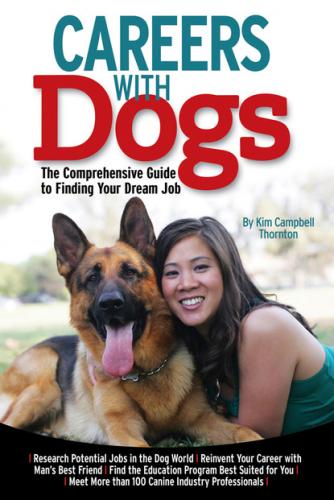In all of these positions, veterinarians are more likely to work with people and paperwork than pets. For veterinarians who are OK with that, government service is a growth field. There’s a critical need for the services of veterinarians. A 2009 report from the Government Accountability Office says there’s a dangerous shortage of veterinarians to fill essential positions in the federal government, a problem that could seriously affect animal and public health.
State governments employ state veterinarians to enforce laws and regulations to protect animal health, as well as to advise the state on animal diseases that may affect human health. State veterinarians also investigate outbreaks of such diseases. (See chapter 10.) Municipal governments also hire veterinarians for their public health departments. Their duties involve the sanitary control of meat and milk production and investigation of food-poisoning epidemics. State veterinarians are also involved in the protection of the public—humans and animals—in the event of a natural disaster or a terror attack. Jacob Casper, DVM, is past coordinator of disaster services for the Maryland Department of Agriculture and past cochair of the Maryland Animal Disaster Planning Advisory Committee. These positions called for him to resolve any agricultural or animal-related problems that developed during disasters. The preparation exercises he took part in involved nuclear power plants, winter storms, hurricanes, and terrorism.
John M. Olin: Hip (and Elbow) Dogman
“Well-known inventor, industrialist, philanthropist, conservationist, and sportsman” is how the Orthopedic Foundation for Animals (OFA) describes its founder John M. Olin. Olin’s legacy lives on at such universities as Harvard, Yale, Georgetown, Stanford, Columbia, and Washington University, whose libraries, programs, or fellowships bear his name. Beyond his business and philanthropy, Olin was a dog man and participated with his Labrador Retrievers in field trials. His most famous Lab was King Buck, the National Championship Stakes winner in 1952 and 1953, whose likeness was immortalized by the U.S. Post Office on a postage stamp. After a number of his dogs were struck with the debilitating disease known as hip dysplasia, Olin set out to rectify the situation and formed the OFA in 1966. Today the OFA maintains databases for purebred dogs for hip dysplasia as well as for at least twenty other diseases. The organization also offers DNA testing for other diseases and databases for cats. Olin’s intentions in creating the OFA are reflected in the organization’s mission statement: “To improve the health and well being of companion animals through a reduction in the incidence of genetic disease.”
In Korea, at a mobile veterinary treatment facility, two veterinarians, Lt. Park Sung-gu and Maj. Michelle Franklin, help load an injured working dog for transport to a recovery area.
Military
Military veterinarians may receive post-DVM training in such areas as public health, pathology, pharmacology, physiology, toxicology, food technology, and laboratory-animal medicine. They help improve animal-care systems in underdeveloped and war-torn countries. Like other government veterinarians, they are more likely to work with policy than pets.
Colonel Donald L. Noah, DVM, who has a specialty in veterinary preventive medicine, is a foreign-animal-disease diagnostician and an international expert on protecting animals and people against biological terrorism. In his job as acting deputy assistant secretary of defense for force health protection and readiness, he directs the development and implementation of policies and programs regarding deployment medicine, health protection, national disaster support, and medical readiness for 2.3 million service members. He frequently speaks on protection against biological terrorism to audiences of veterinarians, students, businesspeople, and government and military officials, stressing the role that veterinarians play in protecting the food supply and public health.
Some military veterinary jobs do involve direct contact with dogs and other animals. The U.S. Army Veterinary Service (AVS) offers career opportunities in public health and food safety and clinical practice. Members of the AVS help care for military working dogs, working animals for various Department of Homeland Security organizations, ceremonial horses, and pets owned by service members.
U.S. Air Force veterinarians serve as public health officers in the Biomedical Science Corps. Their job involves surveillance of disease trends, food-safety practices, and facility sanitation. At air force bases around the world, they manage programs to control occupational illness, food-borne disease, and communicable disease.
Zoos and Beyond
For veterinarians with an interest in wildlife, there are many exciting opportunities. Those who choose to work with wildlife close to home may find careers in zoos, aquariums, and animal parks. Some wildlife veterinarians work at universities or government agencies or for nongovernmental organizations. Others are employed by corporations. A wildlife veterinarian may be employed by the Centers for Disease Control as an international epidemiologist or by a university to study the effects of climate and other environmental changes on wildlife health. Those seeking wider adventure may find themselves performing fieldwork around the world.
PRACTICE CHOICES RESOURCES
American Animal Hospital Association, www.healthypet.com
American Veterinary Medical Association, www.avma.org
Centers for Disease Control, www.cdc.gov/about/opportunities/careers/veterianarian.htm
U.S. Army Veterinary Service, www.veterinaryservice.army.mil
U.S. Department of Agriculture, www.aphis.usda.gov/animal_health
U.S. Public Health Service Commission Corps, www.usphs.gov
Конец ознакомительного фрагмента.
Текст предоставлен ООО «ЛитРес».
Прочитайте эту книгу целиком, купив полную легальную версию на ЛитРес.
Безопасно оплатить книгу можно банковской картой Visa, MasterCard, Maestro, со счета мобильного телефона, с платежного терминала, в салоне МТС или Связной, через PayPal, WebMoney, Яндекс.Деньги, QIWI Кошелек, бонусными картами или другим удобным Вам способом.
